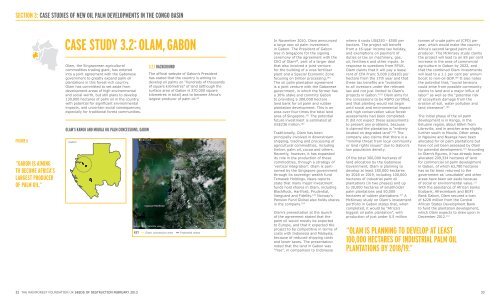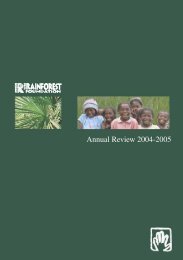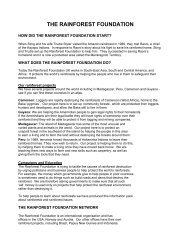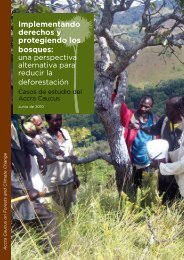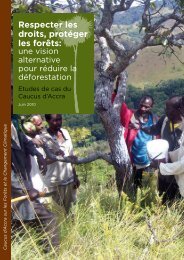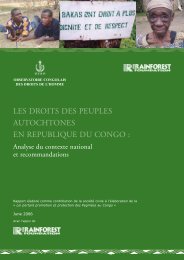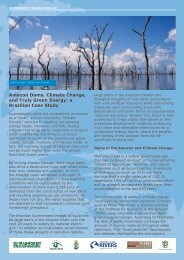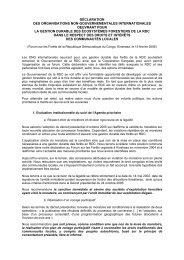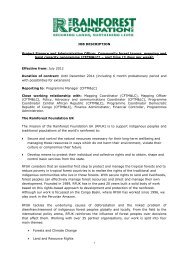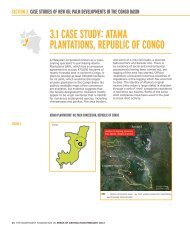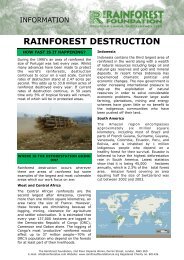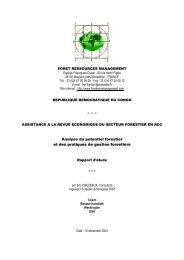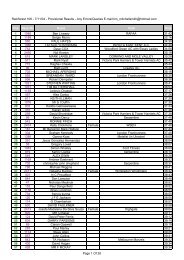Seeds of Destruction - Rainforest Foundation UK
Seeds of Destruction - Rainforest Foundation UK
Seeds of Destruction - Rainforest Foundation UK
Create successful ePaper yourself
Turn your PDF publications into a flip-book with our unique Google optimized e-Paper software.
SECTION 3: CASE STUDIES OF NEW OIL PALM DEVELOPMENTS IN THE CONGO BASIN<br />
FIGURE 6<br />
“Gabon is aiming<br />
to become Africa’s<br />
largest producer<br />
<strong>of</strong> palm oil.”<br />
CASE STUDY 3.2: OLAM, GABON<br />
Olam, the Singaporean agricultural<br />
commodities trading giant, has entered<br />
into a joint agreement with the Gabonese<br />
government to greatly expand palm oil<br />
plantations in this forest-rich country.<br />
Olam has committed to set aside from<br />
development areas <strong>of</strong> high environmental<br />
and social worth, but still plans to develop<br />
130,000 hectares <strong>of</strong> palm oil in the country,<br />
with potential for significant environmental<br />
impacts, and uncertain social consequences,<br />
especially for traditional forest communities.<br />
Olam’s Kango and Mouila oil palm concessions, Gabon<br />
Gabon<br />
Libreville<br />
3.2.1 BACKGROUND<br />
The <strong>of</strong>ficial website <strong>of</strong> Gabon’s President<br />
has stated that the country is aiming to<br />
develop oil palms on “hundreds <strong>of</strong> thousands<br />
<strong>of</strong> square kilometres” <strong>of</strong> land (although the<br />
surface area <strong>of</strong> Gabon is 270,000 square<br />
kilometres in total) and to become Africa’s<br />
largest producer <strong>of</strong> palm oil. 98<br />
Ogooue-Maritime<br />
Google Maps Satellite view<br />
Kango OP Plantation<br />
Moyen-Ogooue<br />
Ngounie<br />
KEY Olam concession area Protected areas<br />
Mouila 1<br />
In November 2010, Olam announced<br />
a large new oil palm investment<br />
in Gabon. The President <strong>of</strong> Gabon<br />
was in Singapore for the signing<br />
ceremony <strong>of</strong> the agreement with the<br />
CEO <strong>of</strong> Olam 99 , part <strong>of</strong> a larger deal<br />
that also involved a joint venture<br />
for the building <strong>of</strong> a urea fertiliser<br />
plant and a Special Economic Zone<br />
focusing on timber processing. 100<br />
The oil palm plantation agreement<br />
is a joint venture with the Gabonese<br />
government, in which the former has<br />
a 30% stake and commits Gabon<br />
to providing a 300,000 hectare<br />
land bank for oil palm and rubber<br />
plantation development. This is an<br />
area over four times the total land<br />
area <strong>of</strong> Singapore. 101 The potential<br />
future investment is estimated at<br />
US$236 million. 102<br />
Traditionally, Olam has been<br />
principally involved in downstream<br />
shipping, trading and processing <strong>of</strong><br />
agricultural commodities, including<br />
timber, palm oil, cocoa and others.<br />
Recently, however, it has expanded<br />
its role in the production <strong>of</strong> these<br />
commodities, through a strategy <strong>of</strong><br />
‘vertical integration’. Olam is partowned<br />
by the Singapore government<br />
through its sovereign wealth fund<br />
Temasek Holdings. News reports<br />
state that many major investment<br />
funds hold shares in Olam, including<br />
BlackRock, Hartford, Prudential,<br />
Vanguard and Fidelity. 103 Norway’s<br />
Pension Fund Global also holds shares<br />
in the company. 104<br />
Olam’s presentation at the launch<br />
<strong>of</strong> the agreement stated that the<br />
palm oil would mostly be exported<br />
to Europe, and that it expected the<br />
project to be competitive in terms <strong>of</strong><br />
costs with Indonesia and Malaysia,<br />
because <strong>of</strong> reduced shipping costs<br />
and lower taxes. The presentation<br />
noted that the land in Gabon was<br />
“free”, in comparison to Indonesia<br />
where it costs US$250 - $500 per<br />
hectare. The project will benefit<br />
from a 16-year income tax holiday,<br />
and exemptions on payment <strong>of</strong><br />
duties or tax on machinery, gas,<br />
oil, fertilisers and other inputs. In<br />
response to questions from RF<strong>UK</strong>,<br />
Olam claims that it will pay a lease<br />
rent <strong>of</strong> CFA Franc 5,000 (US$10) per<br />
hectare from the 17th year and that<br />
these tax benefits are “available<br />
to all investors under the relevant<br />
law and not just limited to Olam’s<br />
projects in Gabon.” 105 Olam aims for<br />
the concessions to be RSPO certified,<br />
and that planting would not begin<br />
until social and environmental impact<br />
and high conservation value forest<br />
assessments had been completed.<br />
It did not expect these assessments<br />
to present any problems, because<br />
it claimed the plantation is “entirely<br />
located on degraded land”. 106 The<br />
company also claims that there is a<br />
“minimal threat from local community<br />
or land rights issues” due to Gabon’s<br />
low population density.<br />
Of the total 300,000 hectares <strong>of</strong><br />
land allocation by the Gabonese<br />
Government, Olam is planning to<br />
develop at least 180,000 hectares<br />
by 2018 or 2019, including 100,000<br />
hectares <strong>of</strong> industrial palm oil<br />
plantations (in two phases) and up<br />
to 30,000 hectares <strong>of</strong> smallholder<br />
palm plantations and 50,000<br />
hectares <strong>of</strong> rubber plantations. 107 A<br />
McKinsey study on Olam’s investment<br />
portfolio in Gabon states that, when<br />
completed, it would be “Africa’s<br />
biggest oil palm plantation”, with<br />
production <strong>of</strong> just under 0.5 million<br />
tonnes <strong>of</strong> crude palm oil (CPO) per<br />
year, which would make the country<br />
Africa’s second largest palm oil<br />
producer. The McKinsey study claims<br />
the project will lead to an 85 per cent<br />
increase in the area <strong>of</strong> commercial<br />
agriculture in Gabon by 2022, and<br />
that the combined Olam investments<br />
will lead to a 1.1 per cent per annum<br />
boost to non-oil GDP. 108 It also notes<br />
the potential that, “social tensions<br />
could arise from possible community<br />
claims to land and a major influx <strong>of</strong><br />
labor” as well as the “potential risk<br />
<strong>of</strong> ecosystem damage from the<br />
erosion <strong>of</strong> soil, water pollution and<br />
land clearance”. 109<br />
The initial phase <strong>of</strong> the oil palm<br />
development is in Kango, in the<br />
Estuaire region, about 60km from<br />
Libreville, and in another area slightly<br />
further south in Mouila. Other areas<br />
in Ngouine and Nyanga have been<br />
allocated for oil palm plantations but<br />
have not yet been assessed by Olam<br />
for potential development. 110 According<br />
to Olam’s figures, it has already been<br />
allocated 209,334 hectares <strong>of</strong> land<br />
for commercial oil palm development<br />
in Gabon, <strong>of</strong> which 63,780 hectares<br />
has so far been returned to the<br />
government as ‘unsuitable’ and other<br />
areas have been set aside because<br />
<strong>of</strong> social or environmental value. 111<br />
With the assistance <strong>of</strong> African banks<br />
Ecobank, Afreximbank and BGFI<br />
Bank Gabon, Olam secured a loan<br />
<strong>of</strong> $228 million from the Central<br />
African States Development Bank<br />
to fund the plantation development,<br />
which Olam expects to draw upon in<br />
December 2012. 112<br />
“OLAM IS PLANNING TO DEVELOP AT LEAST<br />
100,000 HECTARES OF INDUSTRIAL PALM OIL<br />
PLANTATIONS BY 2018/19.”<br />
Satellite view<br />
32 THE RAINFOREST FOUNDATION <strong>UK</strong> SEEDS OF DESTRUCTION FEBRUARY 2013 33


